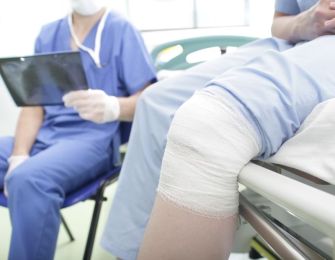 Hip injuries are never an easy ordeal for folks of any age. From slips and falls to car accidents, these mishaps can result in extensive damage to the hips. While pain relievers and therapeutic massages may give some pain and stiffness relief, they cannot correct the issues or stop recurring pain. Hip surgery may be the only way to prevent dislocation and to regain mobility and balance.
Hip injuries are never an easy ordeal for folks of any age. From slips and falls to car accidents, these mishaps can result in extensive damage to the hips. While pain relievers and therapeutic massages may give some pain and stiffness relief, they cannot correct the issues or stop recurring pain. Hip surgery may be the only way to prevent dislocation and to regain mobility and balance.
After exhausting non-surgical approaches, your physician may recommend hip replacement surgery. When deciding on this surgery, there are a few things to keep in mind. For one, this procedure works best with the anterior approach. The Anterior approach ensures less damage to the significant muscles since the surgeon works between them.
The anterior hip replacement surgical procedure replaces the hip joint without cutting through muscle fiber. The surgeon does not have to detach muscles from bones then reattach them later. There is less post-operative pain, therefore, reducing pain medication for patients. Many patients are concerned about the use of pain relievers because they can be addictive and may cause more health issues down the road.
Patients that undergo this approach tend to recover faster as well. While there will be post-operative rehabilitation, patients can bend at the hip and bear weight sooner. They can also use crutches or walkers to get around as well as scooters. Studies have shown that anterior procedures result in patients being able to walk six days earlier than other patients that have undergone different techniques.
Patients will experience a better range of motion in most cases. While this is not guaranteed for all, most folks can bend at the hip and regain their mobility and balance. This result is due to fewer muscles being cut during the surgery, which ensures quicker healing.
For more information on the different approaches to hip surgery contact Dr. Dan Albright for a consultation. Call 919-863-6808 to schedule an appointment.

 Hip injuries can result in severe pain and restricted mobility for sufferers. Most patients will take pain relievers or receive therapeutic care from their doctors. However, if the pain continues to persist, only corrective surgical procedures can fix the issue.
Hip injuries can result in severe pain and restricted mobility for sufferers. Most patients will take pain relievers or receive therapeutic care from their doctors. However, if the pain continues to persist, only corrective surgical procedures can fix the issue.  Any person involved in an accident or suffering conditions like arthritis, and have their hip joints damaged, require complex surgeries to repair the damaged areas.
Any person involved in an accident or suffering conditions like arthritis, and have their hip joints damaged, require complex surgeries to repair the damaged areas. 
 When you have pain in your knee, you want to resolve it once and for all. After trying multiple non-surgical solutions, there may come a time when you opt for surgery. Before you head into the operating room, there are some things you must know about
When you have pain in your knee, you want to resolve it once and for all. After trying multiple non-surgical solutions, there may come a time when you opt for surgery. Before you head into the operating room, there are some things you must know about  When you have a hip injury that is causing overwhelming pain, you will seek a suitable remedy to alleviate the pain. Doctors will recommend anti-inflammatory drugs that will help control the pain, but sometimes the drugs may not work. After exhausting all non-surgical remedies,
When you have a hip injury that is causing overwhelming pain, you will seek a suitable remedy to alleviate the pain. Doctors will recommend anti-inflammatory drugs that will help control the pain, but sometimes the drugs may not work. After exhausting all non-surgical remedies,  Having healthy and robust knees is crucial when executing day-to-day activities. At times, accidents and injuries occur, and you require surgery. In the case of knee surgery, the recovery may be challenging. Depending on the patient’s physical health and fitness before the surgery, recovery may take anywhere from six weeks to one year. So, how can you recover from
Having healthy and robust knees is crucial when executing day-to-day activities. At times, accidents and injuries occur, and you require surgery. In the case of knee surgery, the recovery may be challenging. Depending on the patient’s physical health and fitness before the surgery, recovery may take anywhere from six weeks to one year. So, how can you recover from  Total hip replacement is an invasive surgical method that entails three or even four incisions in front of the hip. This approach ensures that the hip joint is replaced by pushing the muscles along with tissue aside. The process is done without detaching the tendons. Here is more on direct
Total hip replacement is an invasive surgical method that entails three or even four incisions in front of the hip. This approach ensures that the hip joint is replaced by pushing the muscles along with tissue aside. The process is done without detaching the tendons. Here is more on direct  The medical industry is continually evolving. New research and techniques are coming out regularly. The best example of such an evolution is the
The medical industry is continually evolving. New research and techniques are coming out regularly. The best example of such an evolution is the  Hip pain
Hip pain